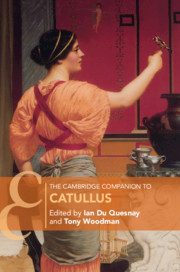Book contents
- The Cambridge Companion to Catullus
- The Cambridge Companion to Catullus
- Copyright page
- Contents
- Notes on Contributors
- Preface
- Introduction
- Chapter 1 Situating Catullus
- Chapter 2 Literary Liaisons
- Chapter 3 Catullan Intertextuality
- Chapter 4 Gender and Sexuality
- Chapter 5 Catullan Themes
- Chapter 6 Language and Style
- Chapter 7 Catullus and Metre
- Chapter 8 Catulli Carmina
- Chapter 9 Catullus and Augustan Poetry
- Chapter 10 Rewriting Catullus in the Flavian Age
- Chapter 11 The Manuscripts and Transmission of the Text
- Chapter 12 Editions and Commentaries
- Chapter 13 Catullus in the Renaissance
- Chapter 14 Catullus and Poetry in English since 1750
- Abbreviations and Bibliography
- Index Locorum
- General Index
Chapter 13 - Catullus in the Renaissance
Published online by Cambridge University Press: 09 April 2021
- The Cambridge Companion to Catullus
- The Cambridge Companion to Catullus
- Copyright page
- Contents
- Notes on Contributors
- Preface
- Introduction
- Chapter 1 Situating Catullus
- Chapter 2 Literary Liaisons
- Chapter 3 Catullan Intertextuality
- Chapter 4 Gender and Sexuality
- Chapter 5 Catullan Themes
- Chapter 6 Language and Style
- Chapter 7 Catullus and Metre
- Chapter 8 Catulli Carmina
- Chapter 9 Catullus and Augustan Poetry
- Chapter 10 Rewriting Catullus in the Flavian Age
- Chapter 11 The Manuscripts and Transmission of the Text
- Chapter 12 Editions and Commentaries
- Chapter 13 Catullus in the Renaissance
- Chapter 14 Catullus and Poetry in English since 1750
- Abbreviations and Bibliography
- Index Locorum
- General Index
Summary
The poems of Catullus were rediscovered around 1300. Manuscript copies were made throughout the fourteenth century, but circulated little, though it appears that Petrarch had access to the text around the middle of the century, and it has sometimes been supposed that he owned a copy of it. Then, in the last quarter of the century, the Florentine humanist Coluccio Salutati had transcribed for him a new complete manuscript, descended at third hand from the original (V), and itself now known as R; and back to this copy most of the proliferating manuscripts of the fifteenth century can be traced. The rebirth of Catullus, therefore, coincides with the ‘Renaissance’ itself: a point to which the looming presence, in traditional accounts, of Petrarch near the beginning of both processes – the assimilation of Catullus and the larger ‘revival of antiquity’ – lends emphasis.
- Type
- Chapter
- Information
- The Cambridge Companion to Catullus , pp. 318 - 342Publisher: Cambridge University PressPrint publication year: 2021

